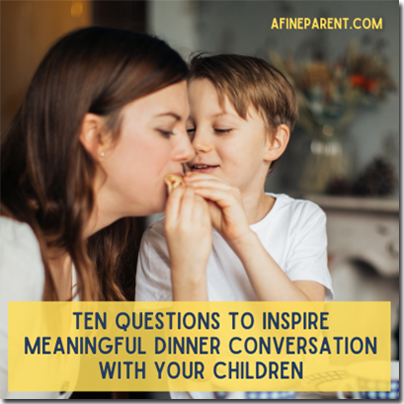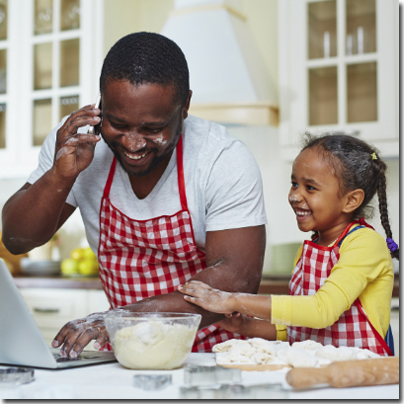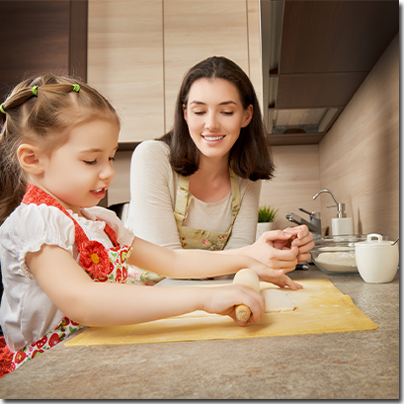 Your family is sitting at the table, with plates of food in front of them. Conversation is flowing naturally, your children are happy and smiling, freely sharing the details of their school day.
Your family is sitting at the table, with plates of food in front of them. Conversation is flowing naturally, your children are happy and smiling, freely sharing the details of their school day.
Wait, what?!
For most parents, the movie-perfect dinnertime is a farfetched fantasy. Let’s be real: school, work, homework, sports, after school activities, and a million other commitments often interfere with the family eating together, much less having the time to converse during it! In fact, recent studies have shown that while 84% of parents agree that eating together is important, only about 50% of meals are actually eaten together as a family.
Finding ways in which to increase opportunities throughout the week in which the entire family can eat together may look like a complex jigsaw puzzle of scheduling- and that’s only part of the struggle!
Even if your family does not eat together as often as you’d like, think about the times in which you do. What does it look like? Are there conversations and eye contact or are all eyes and ears focused on phones, iPads, or the TV? Are there connections being made or is everyone retreating to their own worlds?
While you may want conversation and connection to happen amongst the family, it may not come as easy as you would like, especially after a long, hard day of school and work. The next time you find yourself around the dinner table struggling to prompt conversation, remember that you don’t have to reinvent the wheel.
I often ask my children what the best and worst parts of their days were during dinner. Many times, their replies surprise me. From experiencing wildlife in nature and discovering new recipes to unexpected injuries and unfortunate frenemies, the discussion is strong and allows an inside track to what is going well and what is, frankly, not.
Even science backs the importance of dinner-time conversation! Discussion during family dinners can actually help our children’s language skills, as they listen and engage in conversation. Not only are we getting to know one another better, but parents are also promoting a higher-level vocabulary to our children.
Improved fitness is another benefit of family dinner conversations, as studies have shown that children with a quality family eating environment demonstrate improved general fitness, including evidence of less soda consumption. The benefits don’t stop at physical fitness! The Family Dinner Project states that over three decades of research of regular family meals have shown an improvement in numerous mental health aspects, such as higher self-esteem and lower risk of depression.
There’s no need for another excruciatingly boring dinner, no need to play the guessing game when it comes to their thoughts, wants, or needs, no need to be so isolated while still sitting right next to each other!
In my own journey to better understand how to elicit and prompt dinnertime conversation, I’ve put together ten questions that are meant to inspire meaningful dinner conversation with your children. I hope these are as helpful for your family as they have been for ours!
1. What was the best [and worst] part of your day?
 While it may be a habit for all of us, it’s best to scratch the “How was your day?” question. We know exactly what our children will say, as it is most often the routine “Fine.” It’s easy and pacifying, but what have you learned? Nada. Zilch. Who really knows how the day went? Who really knows anything?
While it may be a habit for all of us, it’s best to scratch the “How was your day?” question. We know exactly what our children will say, as it is most often the routine “Fine.” It’s easy and pacifying, but what have you learned? Nada. Zilch. Who really knows how the day went? Who really knows anything?
Try these instead: “What was the best part of your day?” and “What was the worst or most difficult part of your day?”
Both questions will probably inspire surprising answers. Do be prepared for the latter, though. If you don’t have the head space for a hard conversation at that particular dinnertime, you may want to save that for the following evening or another setting. Make sure to revisit the difficult parts of your child’s day soon. There’s invaluable information in there.
2. What did you enjoy learning about today?
Replace the age-old “What did you learn about today?” with “What did you enjoy learning about today?”
We want to know what our kids are interested in. As they can often be fluid, it’s likely that interests can change quickly and often. Paying attention to their interests actually doesn’t begin at the dinner table; we can listen and observe throughout the day to better understand our child’s passions.
Why is it so important to understand our child’s interests? Insight on passions will give us a plethora of knowledge into how we can foster those interests in positive ways.
3. What do you like about it?
 If you’ve asked the question and discovered that your child’s new interest is something you do not know much about, have no interest in yourself, or even think is perhaps a little bit odd…it doesn’t matter!
If you’ve asked the question and discovered that your child’s new interest is something you do not know much about, have no interest in yourself, or even think is perhaps a little bit odd…it doesn’t matter!
Perhaps it’s something new on social media, a fantastical book series, or a new gadget or gimmicky game. Instead of immediately voicing an obvious or even subtle disapproval, live in the realm of more questions.
“What do you like about it?”
Is it a well-known author? An influencer? Sure, influencer may seem like a silly thought to you, but it can be a big deal to your child. We can nurture deeper relationships with our children by asking open-ended questions with an open mind.
4. What made you laugh today?
I really like this question for multiple reasons.
First, a sense of humor ranks pretty high on what’s important to most people. Understanding and learning to appreciate another persons’ sense of humor can be a great way to relate to them–and there is nothing like watching these little humans we are raising develop their own ability to be funny!
Second, there’s a really solid chance that this conversation is taking place at the end of an exhausting day. I adore the back and forth of an easy conversation, particularly when my brain is tired. Nothing says easy more than when a loved one is talking about what made them laugh. This kind of engagement has such a beautiful, natural quality to it, and one that you wholeheartedly want to be a part of.
And if the first two reasons didn’t convince you, research shows that laughter is truly healthy for your child. From improved sleep and a strengthened immune system to unconventional thinking and a more optimistic view, the power of laughter is real!
5. How is [friend’s name] doing?
 No matter the age, relationships can be hard, and it’s good for you to know how your child’s relationships are faring. The New Times states that “Children’s relationships with their peers directly affect their well-being.” Truth be told, this can have a positive or negative effect. We need to be watchful and engaging.
No matter the age, relationships can be hard, and it’s good for you to know how your child’s relationships are faring. The New Times states that “Children’s relationships with their peers directly affect their well-being.” Truth be told, this can have a positive or negative effect. We need to be watchful and engaging.
Kids are beyond ready to talk about their close friends. This may just send a slow conversation into hyper-drive. And if you receive an odd, distant response, then it may be a cue that there is something your child may want or need to discuss more privately. Kids can often try to endure the relationship-rollercoaster alone, but they don’t have to.
6. How can I help?
Kids have bad days too.
If your dinnertime conversation indicates that a child has had a horrendously horrible day, it can be easy to get caught in the attempt to solve their problems for them. Take a breath and bite your tongue! Instead of launching into a well-versed speech about what they should do to fix something or any other sort of helicopter parenting technique, try the simple act of asking if you can help.
Other ways in which you may provide support to a child after a hard day may include spinoffs such as “Do you want to play a chill game after dinner?” or “Do you remember when …?” if you think they may just need a nostalgic escape.
7. If you were to choose any song to sum up your day, what would it be?
 Let’s have a little fun, shall we? Just burst out singing. After everyone is done laughing, explain that if you were going to sum your day up in one song, it would be the one you sang. How about your child?
Let’s have a little fun, shall we? Just burst out singing. After everyone is done laughing, explain that if you were going to sum your day up in one song, it would be the one you sang. How about your child?
Talk about a melodic conversation! Dr. Lawrence J. Cohen, in his book Playful Parenting, shares how we can use fun dialogue and games to make connections with our children- why not use playfulness during dinner conversations?
Suddenly find yourself with a young child who is experimenting with words and testing boundaries by calling someone a “Poopyhead” at dinnertime? Cohen even suggests that we can bring playfulness into the trickier situations of parenting. Instead of becoming frustrated (which can lead to a conversation shutdown), we can make light of this by explaining that “Poopyhead” is actually a secret nickname and continue the conversation with other lighthearted “secret” nicknames.
How amazing that pretend play and humor can help us connect with our children during dinnertime conversation!
 Love the idea that playfulness can lead to better connection with our children?
Love the idea that playfulness can lead to better connection with our children?
We partnered with Dr. Lawrence J. Cohen, licensed psychologist and author, in the Playful Parenting Masterclass to better understand how we can be playful parents (even if it doesn’t come naturally to us!) and to discuss unique and fun ideas for made-up games.
This gem of a masterclass is one of the 70+ masterclasses you get when you join the AFineParent Academy today. Click here to learn more.
8. Do you want to help me make dinner?
This question may come before dinner is on the table, but can be an opening to some extra time spent together.
While cooking together, we can begin casually relaying the ins and outs of our day. It may be surprising how quickly our children will join in on the conversation.
It may also be surprising how dinner-making help may generalize to help with other chores. There can be an empowerment for kids that comes with being asked to “help” around the house; which can then provide even more opportunities for casual conversation.
For children who are especially reluctant to help, we may want to consider strategies such as lightening the mood with music, even letting your child choose the music. Being patient and using frequent praise can also encourage a child’s participation.
9. What do you think is worth remembering about today?
 The ball is totally in your child’s court. Is there something they would like to share that you haven’t really asked about yet? Maybe it wasn’t exactly the best part or the worst. Maybe it even happened to someone else. Maybe it was something bizarre or strange. Whatever the case, this question could help provide quite a thought-provoking response.
The ball is totally in your child’s court. Is there something they would like to share that you haven’t really asked about yet? Maybe it wasn’t exactly the best part or the worst. Maybe it even happened to someone else. Maybe it was something bizarre or strange. Whatever the case, this question could help provide quite a thought-provoking response.
Don’t forget to listen to your child’s words and pay attention to their body language. Their body movements can sometimes be incredibly telling. For example, if your five-year-old is clinging to you, they may be anxious or worried about something. If your eight-year-old is restless, they may be in an uncomfortable situation. Words and mannerisms can both provide an abundance of important information.
10. What are you excited about for tomorrow?
A pretty fantastic question towards the end of the meal is: “What are you excited about for tomorrow?” Not only is this a great wrap up question but it also allows us to recognize emotions and encourage emotional literacy.
Emotions can be hard to talk about, especially the more uncomfortable or tricky ones. In opening the door of emotional literacy, using an “easy” emotion (such as excitement) may be a gentle way of coaching children to talk about their emotions. For younger children who are still learning what each emotion means, we may want to first give our own examples of what we are excited about for tomorrow.
Over time, questions about what situations elicit an easy, fun emotion can evolve into questions about the more difficult ones. Additionally, dinner conversations are perfect opportunities to practice empathy with children. We can promote empathy by encouraging siblings to talk one at a time and listen while another is talking, eliminating screen time so that the speaker can have everyone’s full attention and praising children when they try on another person’s perspective.
Dinner time can be an amazing opportunity for communication, rebuilding connections after being apart all day, and a means to gain better insight into each of your family member’s lives. Our family units provide a built-in group of curious, funny, witty personalities. How amazing it is to have the privilege to sit at the table alongside them and share the numerous attributes, feelings, and experiences that make them all so beautifully unique.
The 2-Minute Action Plan for Fine Parents
Take a few minutes here to contemplate the following questions as a reflection of your current dinnertime conversations. Chat with a partner or friend, ponder the questions mentally during your next long drive, or get out your parenting journal and write about them:
- What does my current dinnertime look like?
- How can we make the commitment to eat together at least a few times a week? Can we also make the commitment to make those meals electronic free?
- What are some parts of my child’s life I’d like to know more about?
- What is one question from above that I think would be a successful way to open conversation?
The Ongoing Action Plan for Fine Parents
After reflecting on our current dinner conversations and what room we may have to make changes, it’s time to put a plan to action! Take the next few weeks using the following steps:
- Over the next week, pick one or two of the above questions to inject in your dinner conversation.
- If dinner is not often spent eating together, talk with your family about what days you will eat together and the expectations about electronics.
- Come to the table, ready to be engaged, ready to listen and respond.
- After a week, reflect on your family dinner conversations. Have they improved? Which questions sparked discussion? Which questions fell flat?
In today’s world, there is so much negativity that we have forgotten how to laugh simply at the silliness of life. But laughter is a healthy thing and it is a necessary respite. We need it to survive the rigors of existence. This blog will help you remember that laughter is ultimately a positive force.
I agree. Laughter is so important!